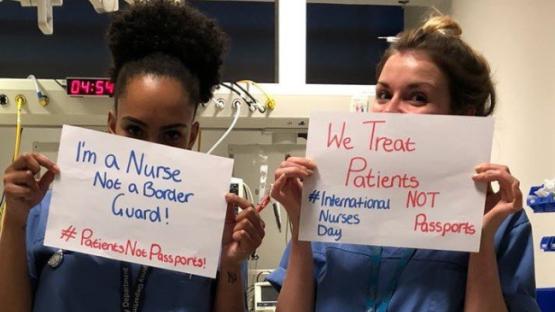
Photo: from Docs Not Cops
Privacy International has joined JCWI, Liberty, Medact and other UK civil society organisations to call on Priti Patel, the UK Home Secretary to enact urgent changes to ensure the safety of migrants in light of the Covid-19 pandemic.

Photo: from Docs Not Cops
The letter has been signed by more than 40 organisations and it is open for individuals to sign.
At the moment, the Department of Health and Social Care has given no assurance that NHS data will not be shared with the Home Office and used for immigration enforcement, including for those people with a confirmed coronavirus diagnosis.
Assurances which were confirmed by the Irish government as part of their response to COVID-19: last week, during a Parliamentary debate, Irish Minister of Health Simon Harris declared that "as the Minister for Health I want to provide an assurance to those people that the health service will treat them with dignity and with absolute privacy and patient confidentiality, as will their social work system, during this time of emergency. We want people to come forward to be tested". A decision welcomed which shows that such changes to existing policies are on the cards.
Not only will this help vulnerable who are in need of healthcare, it is an essential requirement in the broader battle against Covid-19 in the UK.
While everyone is at risk of carrying or contracting the virus, migrant populations can be disproportionately affected because of their existing precarious social, economic and legal contexts.
For example, they might not seek proper care for fear of being reported to the Home Office, or if their inability to work means they fear being charged for any access.
In the UK, the hostile environment and data-sharing arrangements effectively build a border through hospitals, schools, police stations and communities, and pose a real threat to the well-being of people with uncertain immigration status.
Similarly, those who find themselves in detention centres are put at risk through over-crowding, lack of access to healthcare, and access to sanitary facilities. Last week, the UK Home Office announced the release of a third of the more than 900 people currently being held in immigration detention because of their vulnerability to Covid-19.
Unfortunately, we are yet to see these measures elsewhere. In the Moria camp on the island of Lesbos, for instance, close to 20,000 people live in a space designed for just under 3,000. The first case of Covid-19 was confirmed on the island a few days ago.
There are severe concerns not only about the dire situation in which these people are being forced to live but also the impact of public health and efforts to curtail the spread of the virus, and protect as many people as possible from it.
Privacy is foundational to who we are as human beings, and every day it helps us define our relationships with the outside world. It is how we seek to protect ourselves and society against arbitrary and unjustified use of power, by controlling what can be known about us and done to us, while protecting us from those who aim to exert control over our data, and ultimately all aspects of our lives.
In the context of migrant populations, many of who are in particularly vulnerable situations, privacy offers people autonomy, protection from arbitrary interference, and dignity.
The UK immigration and asylum system is still reeling from the Windrush Scandal and other failures. A crucial part of ensuring it treats people fairly and with dignity is ensuring people's privacy and other rights are protected. How these stand up as this crises develops will reveal the extent to which lessons from past failures have been learned, or ignored.
Photo: Docs Not Cops